Overview
The article highlights the transformative power of augmented reality (AR) solutions in real estate marketing through innovative applications such as:
- Virtual tours
- Immersive storytelling
- Enhanced client interactions
These AR technologies significantly boost engagement, expedite sales processes, and elevate customer satisfaction by enabling prospective buyers to visualize properties effectively. Research indicates that such advancements empower clients to make informed decisions without the need for physical visits, ultimately reshaping the landscape of real estate transactions.
Introduction
Augmented reality is more than a mere buzzword; it is fundamentally reshaping the landscape of real estate marketing in profound ways. As consumers increasingly demand interactive and immersive experiences, real estate professionals must adapt to meet these evolving expectations. This article explores seven innovative ways augmented reality solutions are enhancing property marketing, providing agents and developers with a unique opportunity to engage clients like never before. How can these cutting-edge technologies not only capture attention but also drive sales and foster lasting connections in a competitive market?
Magic Playbox: Elevate Real Estate Marketing with Immersive AR Experiences
Magic Playbox stands at the forefront of revolutionizing property marketing through immersive augmented reality house experiences. By leveraging advanced technology, the studio crafts interactive stories that empower prospective clients to visualize properties in unprecedented ways. This innovative approach significantly enhances engagement, allowing real estate agents and developers to present their listings more effectively.
Properties showcased with AR experiences can sell approximately 31% faster, optimizing marketing costs and increasing return on investment. Furthermore, AR technology enables purchasers to explore homes remotely, providing a realistic sense of layout and ambiance without the need for physical visits.
As AR continues to gain traction, with 75% of consumers aged 16 to 44 aware of its capabilities, this growing awareness signals a shift in consumer expectations. Magic Playbox's solutions are designed to transform how real estate is promoted, making it more attractive and accessible for potential clients.
By enhancing customer engagement through immersive experiences, AR fosters brand loyalty and satisfaction, ensuring that clients can effectively connect with their target audiences. The studio's commitment to delivering tailored, high-quality experiences ultimately drives sales and enhances customer satisfaction.
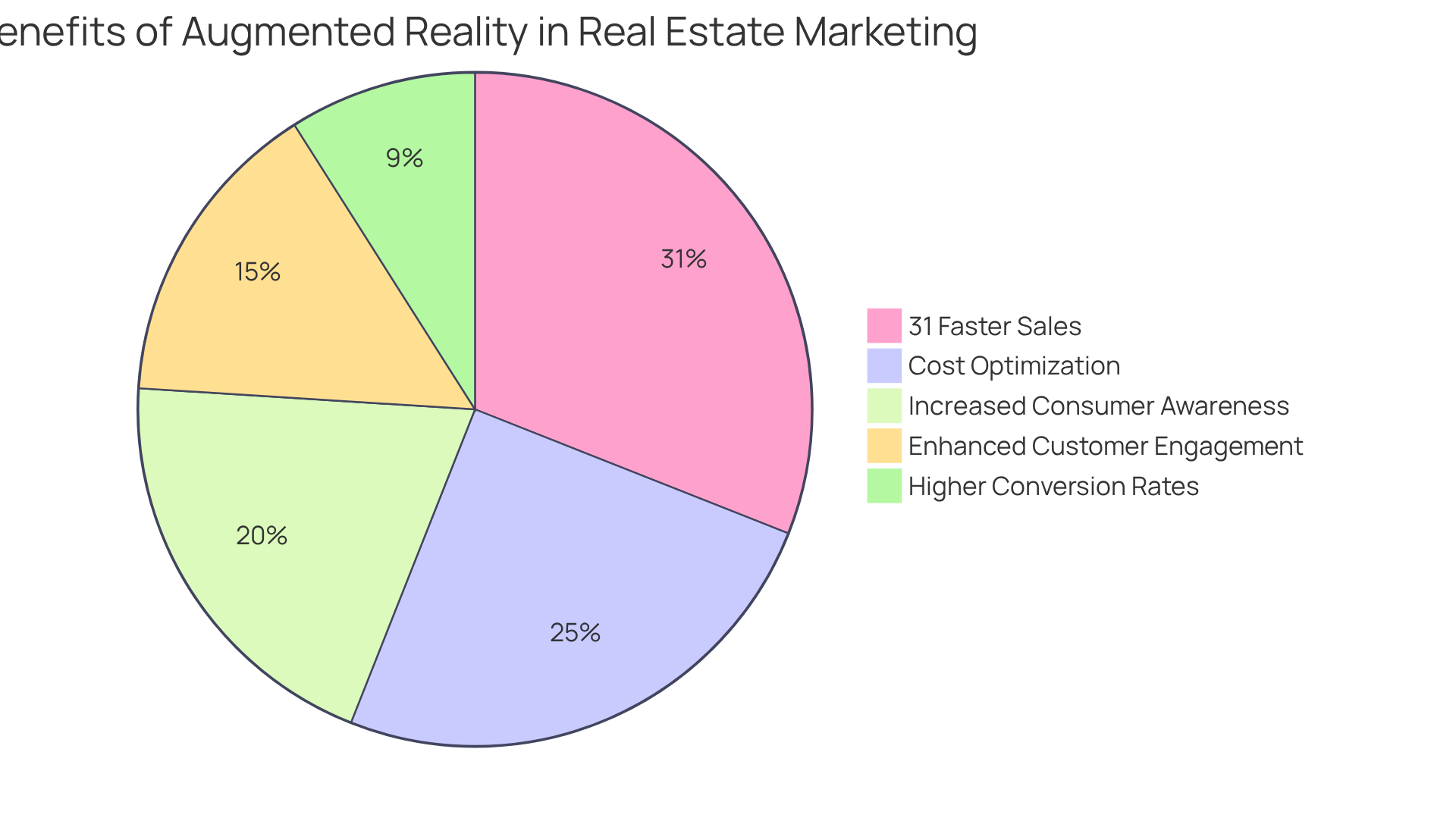
Virtual Property Tours: Engage Buyers with Augmented Reality Experiences
Augmented reality house virtual tours represent a transformative advancement in property marketing, allowing prospective clients to explore listings from the comfort of their homes. This immersive experience significantly enhances their understanding of space and layout, enabling potential buyers to envision themselves within the residence, which greatly amplifies engagement.
Listings that incorporate virtual tours garner 87% more views and generate 48% more interest compared to those showcasing only photos and videos. Furthermore, research indicates that 90% of potential purchasers are more inclined to evaluate a property featuring a virtual tour, underscoring its critical role in modern property marketing.
The provision of a realistic, interactive experience not only boosts inquiries but also accelerates the sales process; homes equipped with virtual tours sell 31% faster and typically at higher prices than those without. Additionally, prospective purchasers engage with websites showcasing virtual tours for 5-10 times longer, further illustrating the enhanced engagement these tools provide.
As demand for virtual tours escalates—67% of home buyers express a preference for listings that include them—augmented reality house tours are becoming indispensable tools for real estate professionals aiming to connect with a broader audience and enhance client confidence.
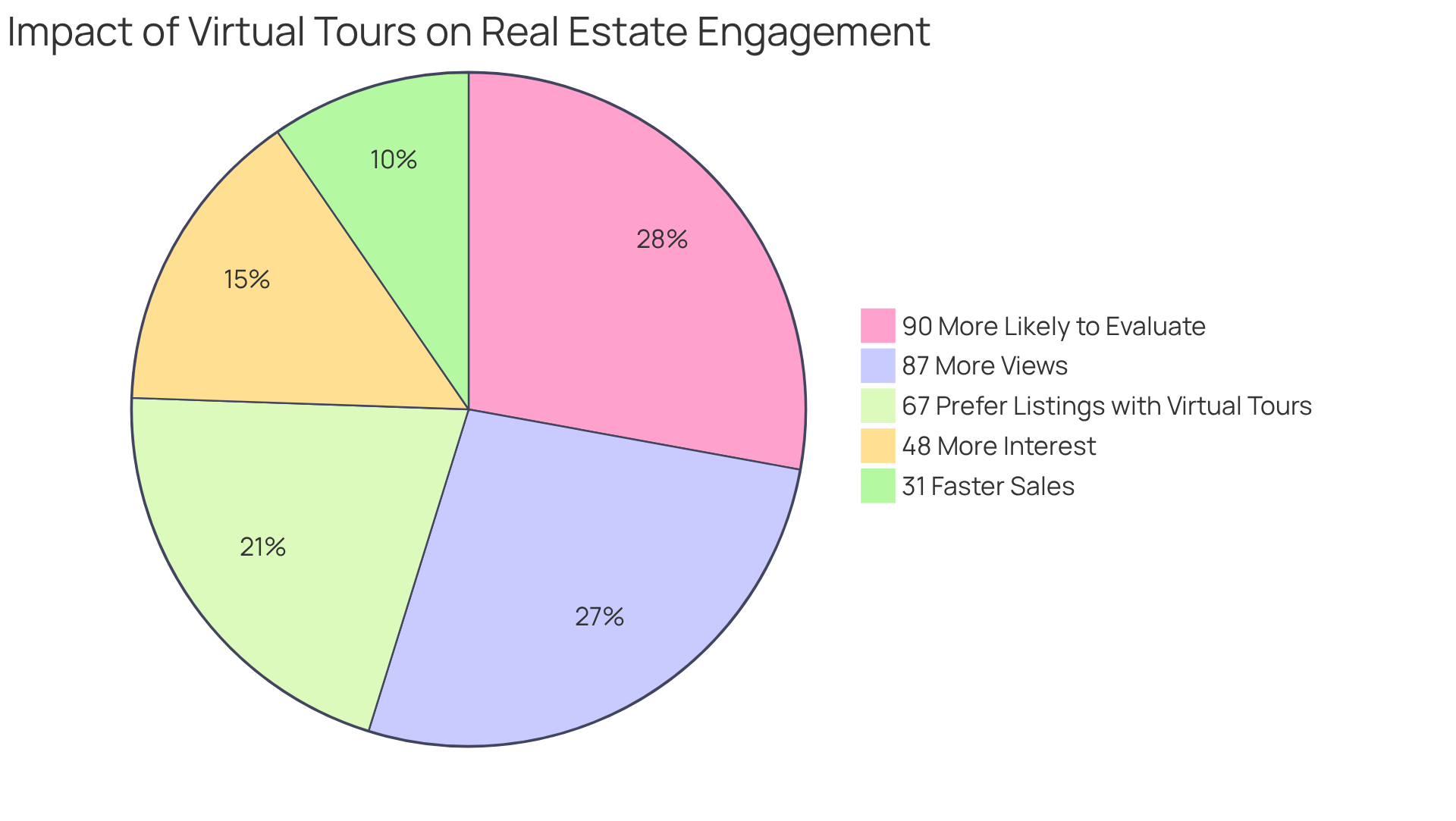
Location-Based AR: Enhance Property Searches with Contextual Insights
Location-based AR applications empower consumers to access contextual information about real estate as they navigate neighborhoods. By simply directing their smartphones at a location, users can retrieve essential information, including nearby schools, parks, and public transport options. This capability not only elevates the real estate search experience but also enables purchasers to make informed decisions that resonate with their lifestyle preferences.
Research indicates that approximately 70% of prospective buyers favor listings featuring virtual tours, underscoring the increasing demand for immersive experiences in real estate. Furthermore, case studies reveal that integrating AR into real estate searches can lead to a remarkable 90% increase in conversion rates, demonstrating its effectiveness in enhancing client engagement and satisfaction.
As augmented reality house technology evolves, it transforms how individuals interact with properties, making the search process more intuitive and informative. With projections estimating AR advertising revenue to reach $5.2 billion by the end of 2024, its significance in the real estate market is undeniably on the rise.
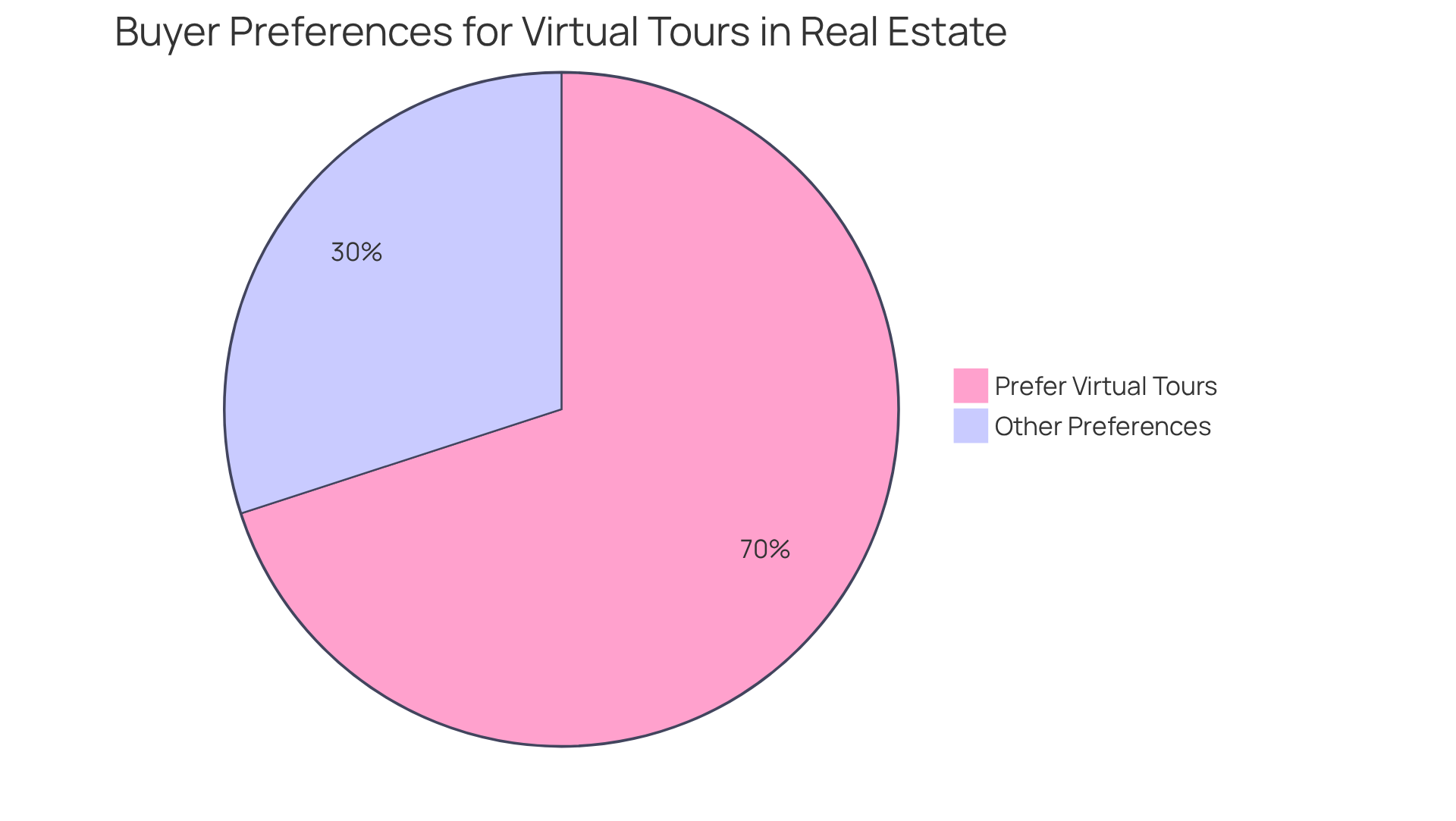
Building Visualization: Use AR for Realistic Renovation Previews
Augmented reality house technology revolutionizes the way consumers visualize renovations and modifications in real-time. By superimposing digital models onto an augmented reality house, potential clients can preview changes before making a commitment. This innovative capability not only streamlines decision-making but also enriches the overall buying experience through the use of an augmented reality house, empowering clients to explore their creative ideas without the need for physical alterations.
Notably, listings featuring 3D tours sell 31% quicker and at a 4-9% increased price on average, underscoring the effectiveness of AR in enhancing consumer confidence and satisfaction. Furthermore, AR tools like AirMeasure provide virtual tape measures for precise space measurements, further instilling customer confidence in their purchasing decisions.
Ultimately, AR enhances buyer confidence, enabling informed decisions regarding modifications and renovations, leading to more satisfying purchase outcomes. As Dan Weisman, Director of Innovation Strategy, asserts, 'AR has been here for a while. Now is the time for property professionals to offer their clients innovative methods to explore more opportunities in current properties.
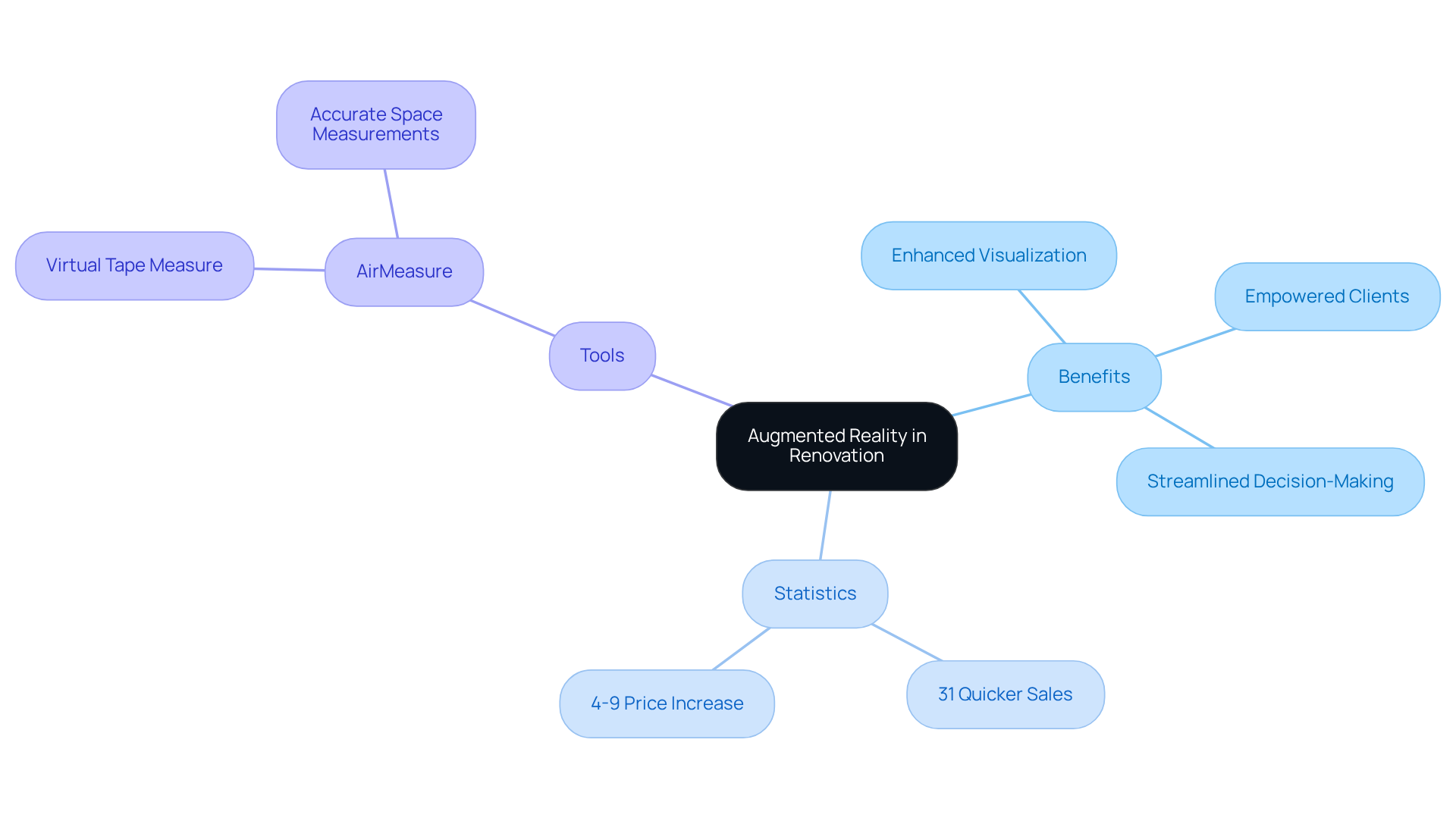
Enhanced Marketing Materials: Integrate 3D Models with AR Technology
Integrating 3D models with augmented reality house technology empowers real estate agents to create visually stunning marketing materials. This approach not only enhances brochures, websites, and social media campaigns but also provides potential buyers with an interactive experience that is increasingly sought after. By enabling users to manipulate and explore 3D representations of properties, agents can deliver a more engaging and informative presentation through an augmented reality house. This strategy is essential for standing out in a competitive market, as it fosters deeper connections with prospective buyers and showcases listings in a compelling manner.
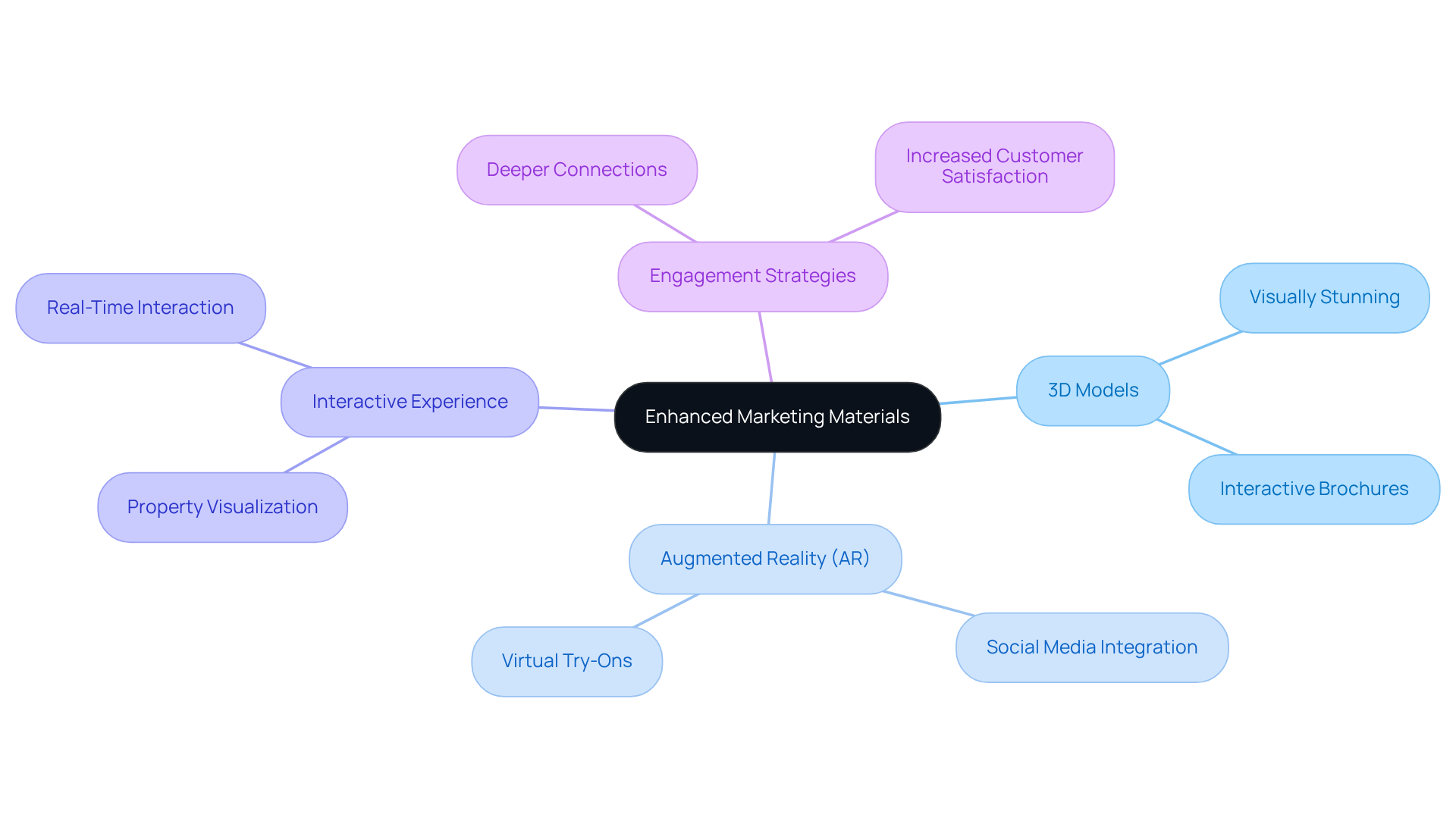
Remote Collaboration: Streamline Client-Agent Interactions with AR
Augmented reality house technology revolutionizes remote collaboration in real estate by creating shared virtual environments where agents and clients can interact seamlessly. This groundbreaking method enables agents to assist clients in navigating listings, emphasizing important aspects and responding to questions instantly, without geographical limitations. Magic Playbox's AR solutions enhance this experience by providing immersive tools that facilitate better visualization of features, making it easier for clients to understand spatial layouts and design elements.
Statistics indicate that 65% of consumers believe AR improves their shopping experience—a sentiment that translates effectively into property interactions. By fostering a more engaging and interactive experience, AR not only streamlines communication but also significantly boosts client satisfaction and engagement. Industry leaders acknowledge that AR's immersive features can change conventional client-agent interactions, making real estate viewing more accessible and enjoyable.
As a result, the augmented reality house is becoming a crucial tool for property professionals who aim to enhance their service offerings and meet the changing expectations of clients. Embrace the future of real estate—invest in AR technology to elevate your client interactions and stay ahead in an ever-evolving market.
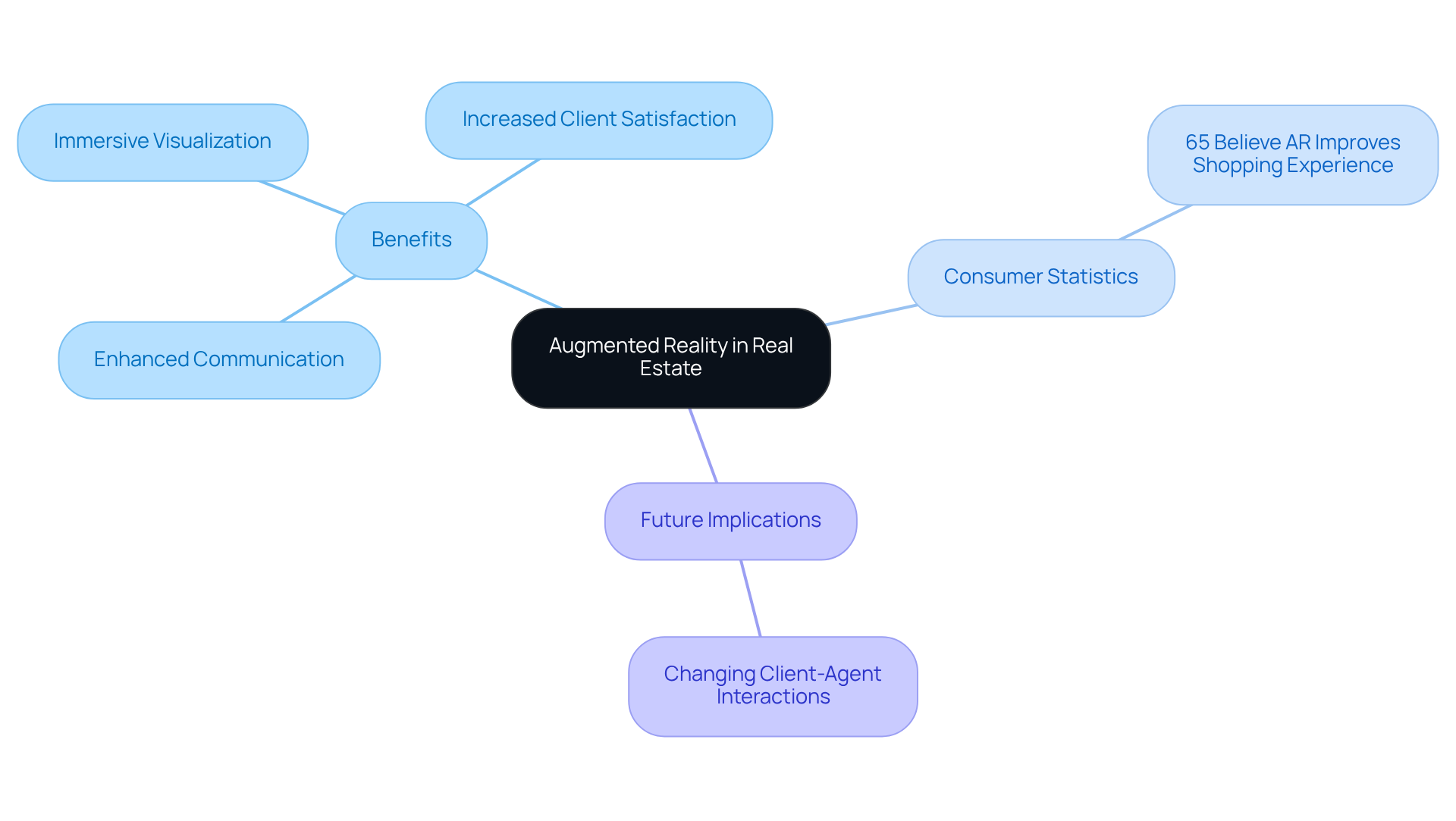
Virtual Staging: Use AR to Showcase Property Potential
Virtual staging through an augmented reality house empowers real estate agents to digitally furnish and decorate properties, effectively showcasing their potential without the need for physical staging. This innovative method not only decreases time and expenses related to conventional staging but also enables potential owners to envision how they could customize the area.
Listings showcasing virtually staged images experience:
- 73% greater engagement
- 73% more quickly sales than unstaged homes, significantly boosting interest from potential purchasers.
Furthermore, 40% of agents representing purchasers confirm that clients are more inclined to arrange walkthroughs for staged properties, further demonstrating the effectiveness of virtual staging in appealing to potential clients. By showcasing a visually appealing depiction of the residence, virtual staging generates a favorable initial impression, causing buyers to feel emotionally engaged and more inclined to move forward with a purchase.
Additionally, AR technology allows agents to emphasize distinctive aspects of a residence, such as fireplaces or vaulted ceilings, which could be missed in vacant areas. Magic Playbox enhances this experience by offering advanced AR solutions that enable users to visualize alterations in spaces, such as converting a bedroom into an office, demonstrating the versatility of AR in improving space presentation.
As the housing market increasingly embraces augmented reality house solutions, listings showcased with Magic Playbox's technology draw more attention and generate greater interest, ultimately leading to faster sales and potentially higher offer prices. Moreover, virtual staging is eco-friendly since it minimizes the requirement for physical furnishings and related waste, making it a sustainable option for contemporary property marketing.
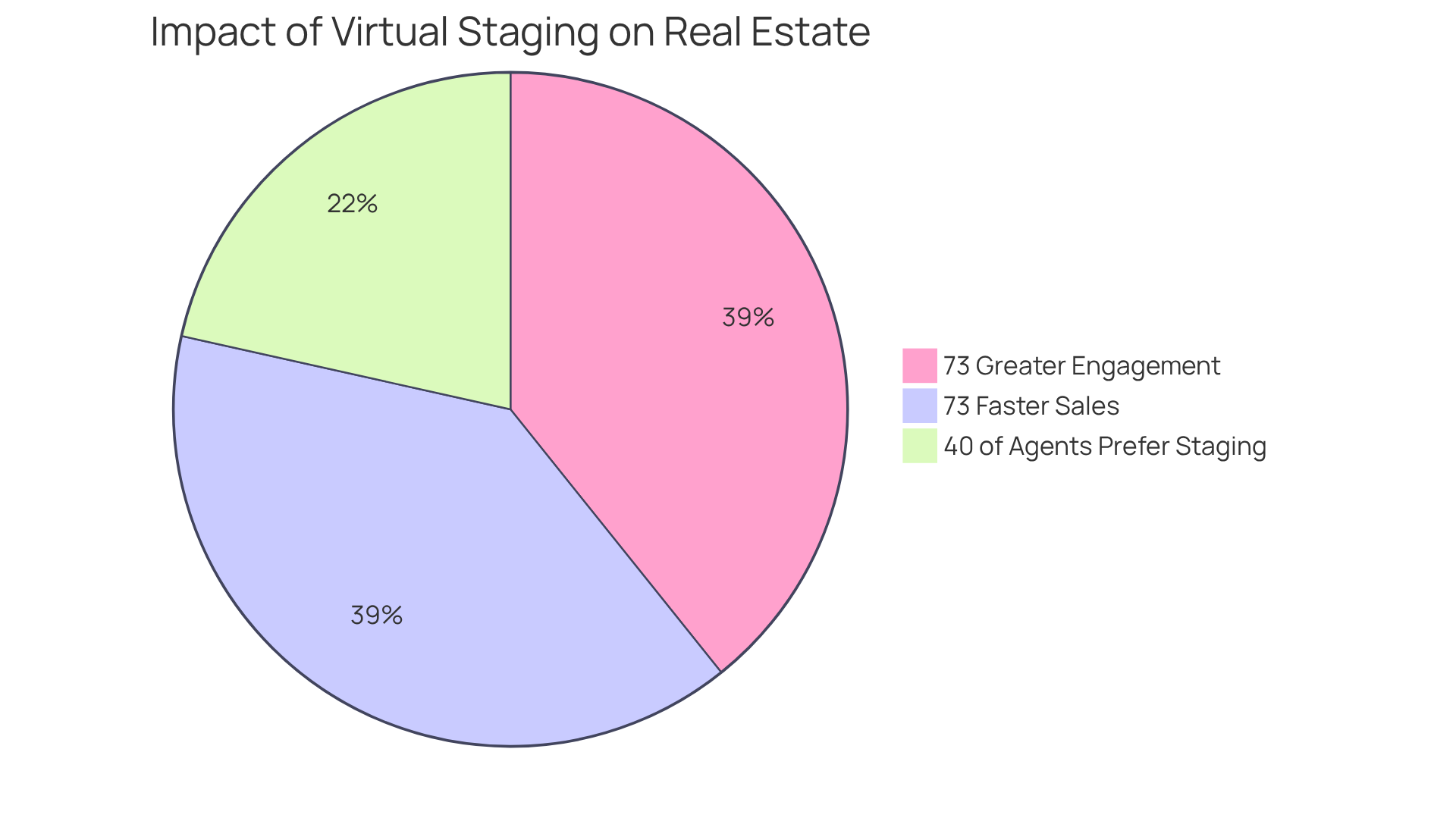
Immersive Storytelling: Highlight Property Features with AR
Augmented reality (AR) technology empowers real estate agents to integrate immersive storytelling into their marketing strategies, crafting interactive experiences that effectively highlight the unique features of their listings. By leveraging AR, agents can narrate the history of a residence or showcase its architectural design elements, transforming standard listings into compelling narratives that resonate deeply with potential clients. This approach not only captivates audiences but also enhances their understanding of the subject, making it more memorable.
For instance, AR can simulate various lighting conditions or enable clients to visualize different furniture arrangements within a space, offering a comprehensive perspective that traditional methods fail to provide. Consequently, listings become more engaging, significantly increasing interest and interaction from prospective buyers.
The impact of AR storytelling on customer engagement is profound, with research indicating that properties enhanced with AR features can experience conversion rates rise by as much as 40%. This innovative application of augmented reality house technology not only elevates the presentation of homes but also fosters a stronger connection between buyers and the residences they are considering.
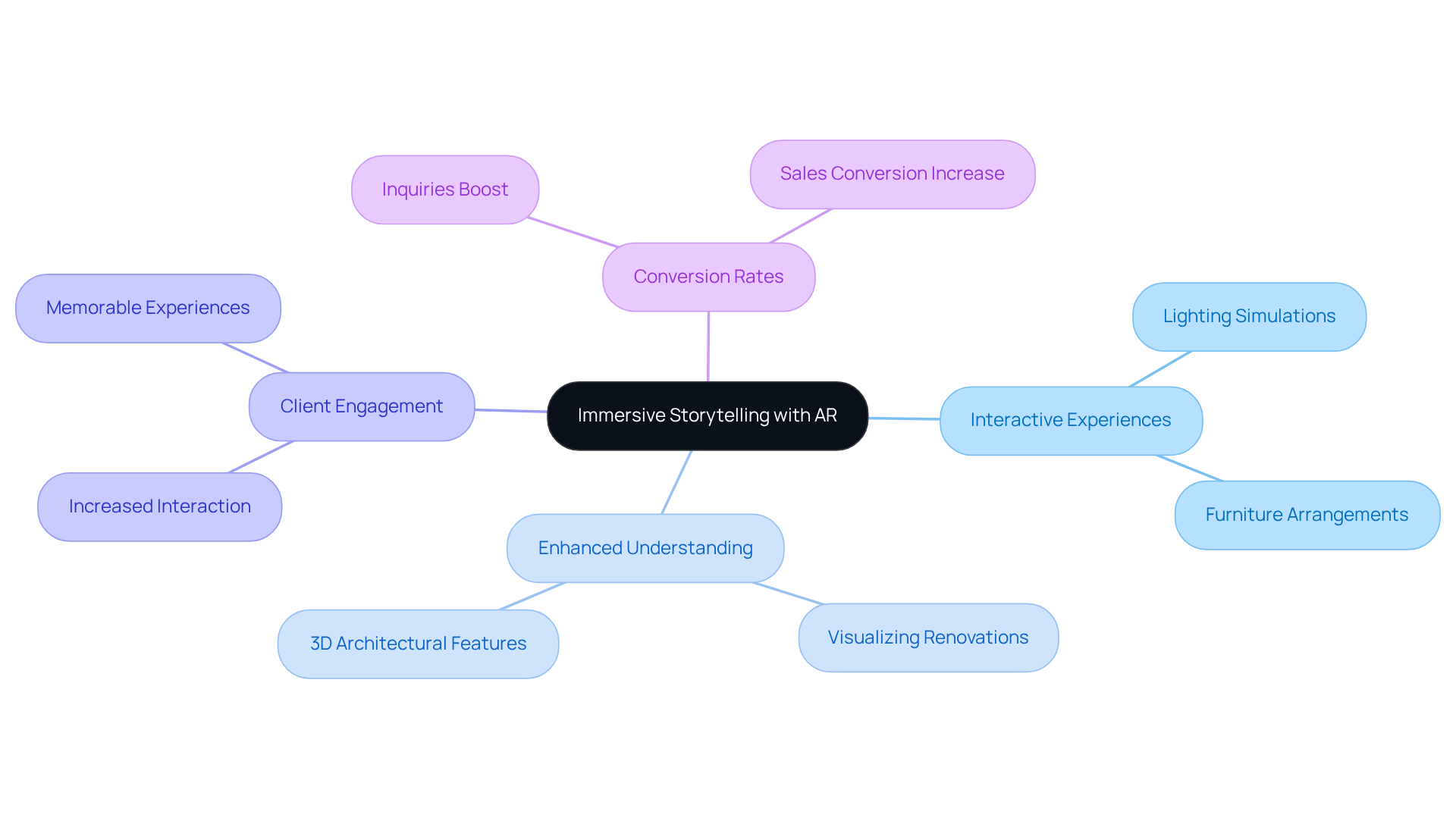
AR Analytics: Leverage Data to Optimize Real Estate Marketing Strategies
Augmented reality house analytics empower real estate professionals to extract critical insights into buyer behavior and preferences. This innovative approach enables agents to analyze data obtained from AR interactions, identifying which features generate the most interest. As a result, they can customize their marketing strategies effectively, ensuring alignment with client needs and fostering deeper engagement.
Research indicates that assets within an augmented reality house sell approximately 31% quicker, while listings with virtual tours demonstrate a similar acceleration in sales. Furthermore, tours of an augmented reality house can boost inquiries by up to 403%, illustrating the significant benefits of integrating AR into marketing efforts.
By leveraging these insights, real estate firms can optimize their marketing strategies and streamline property management, ensuring they remain competitive in a rapidly evolving market.
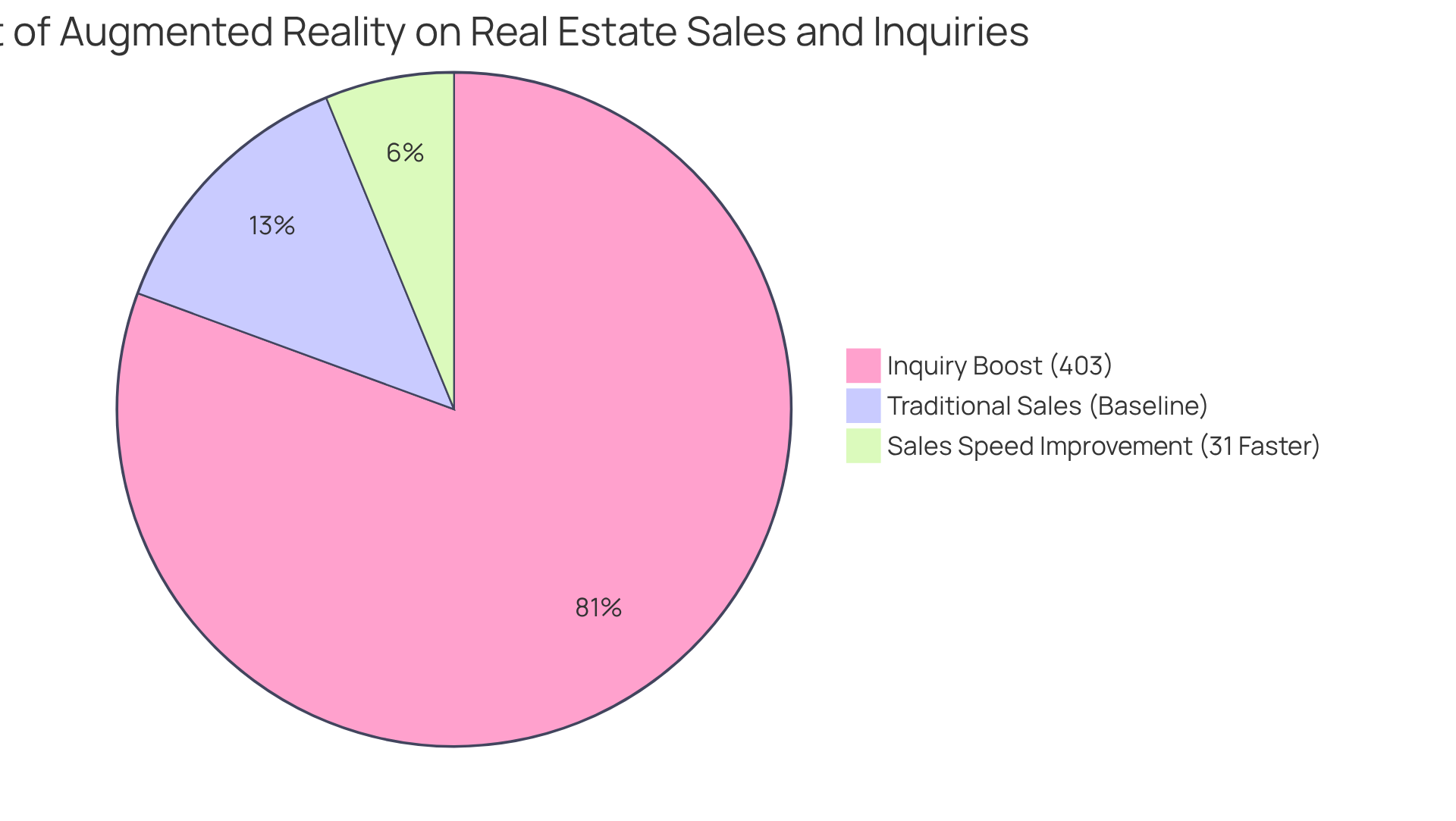
Conclusion
The integration of augmented reality (AR) into real estate marketing signifies a transformative shift in property showcasing and sales. Leveraging immersive experiences, AR not only enhances engagement but also streamlines the buying process, facilitating clients' visualization of their future homes. As technology evolves, the potential for AR to redefine client interactions and marketing strategies becomes increasingly evident.
This article highlights various applications of AR in real estate, such as:
- Virtual property tours
- Location-based insights
- Realistic renovation previews
- Immersive storytelling
Each method significantly enhances buyer engagement and satisfaction. Statistics indicate that properties utilizing AR tools can sell faster and attract more interest than traditional listings. The compelling evidence of AR's effectiveness—evidenced by increased conversion rates and enhanced marketing materials—underscores its vital role in modern real estate strategies.
As the real estate market embraces augmented reality, it is essential for agents and developers to invest in these technologies to remain competitive. By adopting AR solutions, they can not only meet the evolving expectations of consumers but also create more engaging, informative, and enjoyable experiences for potential buyers. Embracing this innovative approach will elevate marketing efforts and shape the future of real estate transactions.
Frequently Asked Questions
What is Magic Playbox and how does it enhance real estate marketing?
Magic Playbox is a studio that revolutionizes property marketing by creating immersive augmented reality (AR) experiences. This technology allows prospective clients to visualize properties in interactive ways, significantly enhancing engagement and enabling real estate agents and developers to present their listings more effectively.
How does augmented reality impact property sales?
Properties showcased with augmented reality experiences can sell approximately 31% faster, optimizing marketing costs and increasing return on investment. AR technology allows purchasers to explore homes remotely, providing a realistic sense of layout and ambiance without needing physical visits.
What is the consumer awareness level of augmented reality technology?
As AR continues to gain traction, 75% of consumers aged 16 to 44 are aware of its capabilities, indicating a shift in consumer expectations towards more immersive property marketing.
What benefits do virtual property tours offer to real estate marketing?
Virtual property tours enhance the property marketing experience by allowing prospective clients to explore listings from home. These tours significantly improve understanding of space and layout, resulting in 87% more views and 48% more interest compared to listings with only photos and videos.
How do virtual tours affect the sales process?
Homes equipped with virtual tours sell 31% faster and typically at higher prices than those without. Additionally, potential buyers engage with websites showcasing virtual tours for 5-10 times longer, indicating increased engagement.
What percentage of home buyers prefer listings with virtual tours?
Research shows that 67% of home buyers express a preference for listings that include virtual tours, making them essential tools for real estate professionals.
How do location-based AR applications enhance property searches?
Location-based AR applications allow consumers to access contextual information about real estate as they navigate neighborhoods. Users can retrieve essential information such as nearby schools, parks, and public transport options, making the real estate search experience more intuitive and informative.
What impact does integrating AR into real estate searches have on conversion rates?
Integrating augmented reality into real estate searches can lead to a remarkable 90% increase in conversion rates, demonstrating its effectiveness in enhancing client engagement and satisfaction.
What is the projected revenue for AR advertising by the end of 2024?
Projections estimate that AR advertising revenue will reach $5.2 billion by the end of 2024, highlighting its growing significance in the real estate market.




